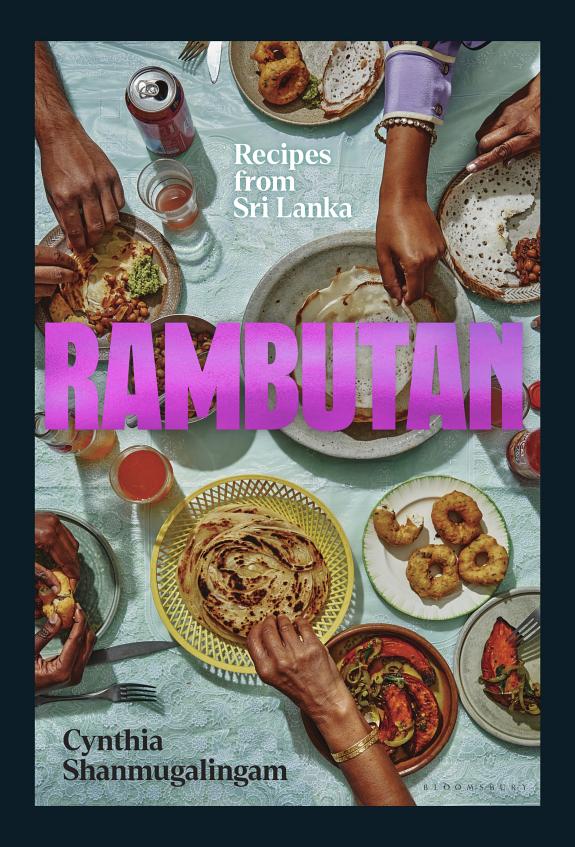
Armchair travel around the world!
Start your reading adventures with our FREE Reading Atlas.

- Around the World in 14 Books
- 7 Thrilling Book Series
- 6 Audiobooks That Are Like Theater For Your Ears



This cookbook (336 pages) was published in October of 2022 by Bloomsbury Publishing. The book takes you to the kitchens and food stalls of Sri Lanka. Melissa read Rambutan and loved it; it wouldn't be on our site if she didn't recommend it.
Bookshop.org is an online bookstore with a mission to financially support independent bookstores and give back to the book community.

This exuberant, candy-colored cookbook is an easy way to import the delicious tastes of Sri Lanka to your dining table. Gorgeous photos, conversational essays, and infectious enthusiasm for food and culture — the whole thing feels like a party.
Author Cynthia Shanmugalingam was born in Coventry, England, in 1981. Her Sri Lankan parents left the island in 1983 when the civil war started. But her father kept Sri Lanka alive in their house, bolstered by annual trips to the island to visit relatives, play in the lush landscapes, and eat their favorite foods.
Fast forward to 2021: Shanmugalingam opened the restaurant Rambutan in London and, the following year, released this cookbook. Both Bon Appetit and the Los Angeles Times named it one of the best cookbooks of 2022. That is no surprise at all.
Comprehensive without being overwhelming, this book features recipes from all corners of the country and the different specialties of the Tamil, Sinhalese, Muslim, and Burgher communities. So there are spicy curries from the north and kottu, the iconic and ubiquitous stir-fried dish from the east. There’s fragrant coconut rice (kiri bath, from the south), and from the west, lamprais — pronounced like lump-rice — a composite of delicious components like curry, rice, fried bits, and condiments all wrapped in a banana leaf. To eat it, you unwrap the bundle with the leaf doubling as a plate.
Aside from the recipes, there are nine helpful, charming essays about Sri Lankan cuisine and culture. Why nine? In Hindu mythology and Sri Lanka, it’s a special number: nine fundamental emotions, the festival of nine nights, and nine Sri Lankan provinces. She offers advice on how and when to temper spices while preparing a curry, and she explains how Sri Lankans eat at a dinner party. Spoiler: There’s a lot of food.
She also vividly describes Muslim street food in a way that will make you want to go to Sri Lanka immediately. Then, in the second half of that essay, she recounts a tragic day during the already tragic civil war when Tamil Tigers killed Muslims praying in a mosque. One of the strengths of this book is Shanmugalingam’s transparency about all that’s lovely and all that’s problematic in her home country.
This collection includes recipes for every part of the meal, with plenty of condiments you can use to spice up simple, everyday meals, too. The recipe headnotes are packed with helpful details and personal stories, so you can imagine foods you’ve never tried before: ‘Breadfruit really does taste like toasty, freshly baked bread… When you crack open the skin, the insides are gloriously fleshy with a single white stone in the middle; the smell like someone has smashed bread pudding into a tropical green body.’
For those of us who didn’t grow up with a Sri Lankan grandmother and access to jackfruit at the local market, there’s a handy guide to ingredients and substitutions, as well as suggested menus for a midweek dinner, big feasts, a Sunday brunch, and a summer barbecue. Our advice: Start with a batch of homemade Sri Lankan curry powder to infuse your kitchen with an irresistible aroma, then crank up a Sri Lankan dance mix on the stereo, and start cooking.
Wise-cracking male friends of my parents noticed developments in my sister and started to ask her — never my brother — ‘What can you cook? Rice? An egg? Dal? before collapsing into insulting giggles. Mocking her for being too Westernised to know even the most basic of dishes, she would roll her eyes, admit she couldn’t cook dal, and go back to listening to Whitney on her Walkman… From all this, we can learn three things. One: listen to Whitney, not to gross dudes. Two: hair is freedom. And three: Sri Lankan dal, or parippu as it is called in both Tamil and Sinhala, is considered an idiot- proof recipe, the hardest to mess up of the Sri Lankan repertoire, and one of the first dishes a young cook learns to make. My sister is now a doctor, a mum of three, she has her own swimming pool and she’s a fantastic cook. She didn’t let the sexist trolls get her down on dal and you shouldn’t either. — Cynthia Shanmugalingam
Wanna help us spread the word? If you like this page, please share with your friends.
Strong Sense of Place is a website and podcast dedicated to literary travel and books we love. Reading good books increases empathy. Empathy is good for all of us and the amazing world we inhabit.
Strong Sense of Place is a listener-supported podcast. If you like the work we do, you can help make it happen by joining our Patreon! That'll unlock bonus content for you, too — including Mel's secret book reviews and Dave's behind-the-scenes notes for the latest Two Truths and a Lie.
Join our Substack to get our FREE newsletter with podcast updates and behind-the-scenes info — and join in fun chats about books and travel with other lovely readers.

We'll share enough detail to help you decide if a book is for you, but we'll never ruin plot twists or give away the ending.
Content on this site is ©2026 by Smudge Publishing, unless otherwise noted. Peace be with you, person who reads the small type.